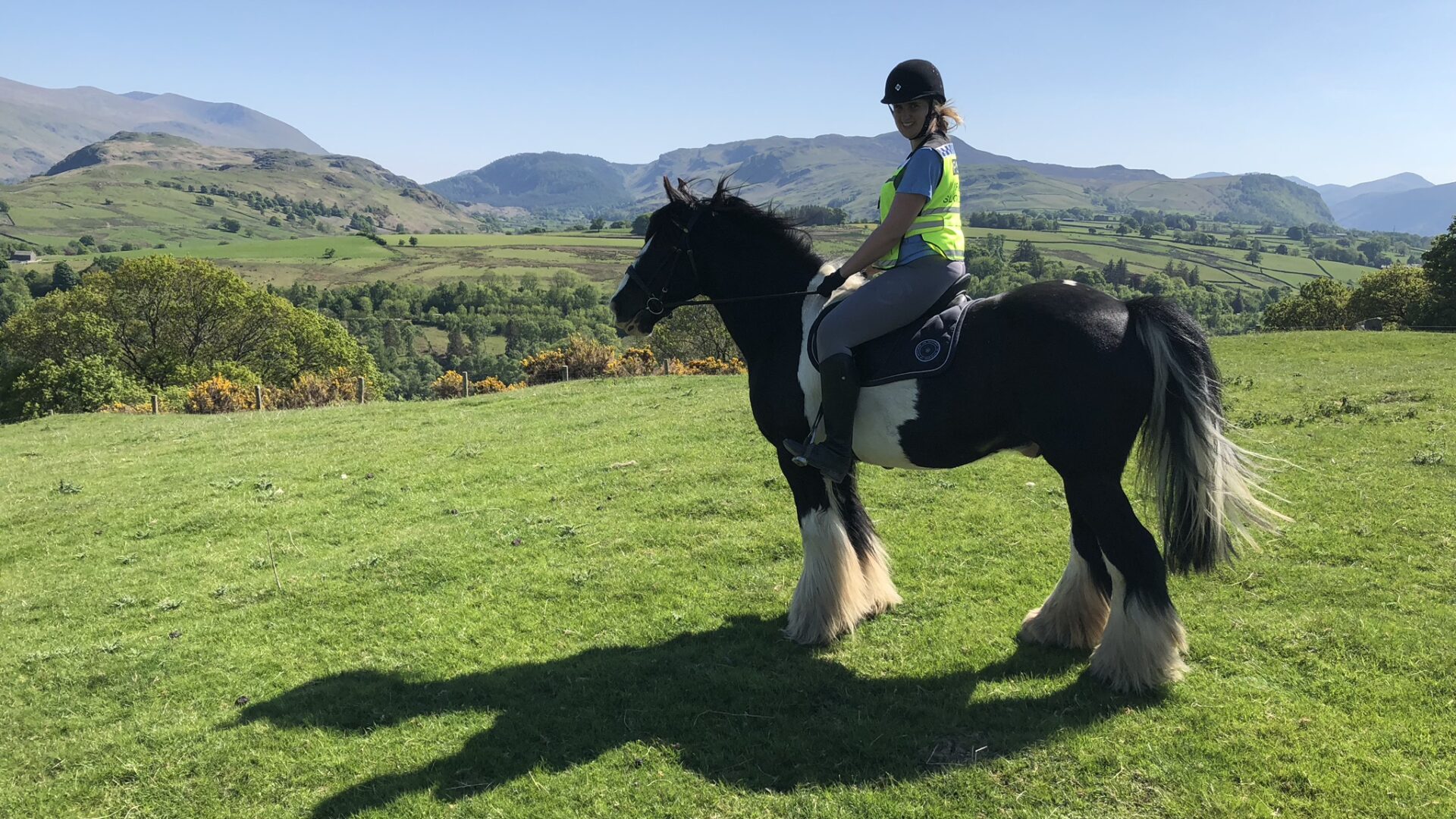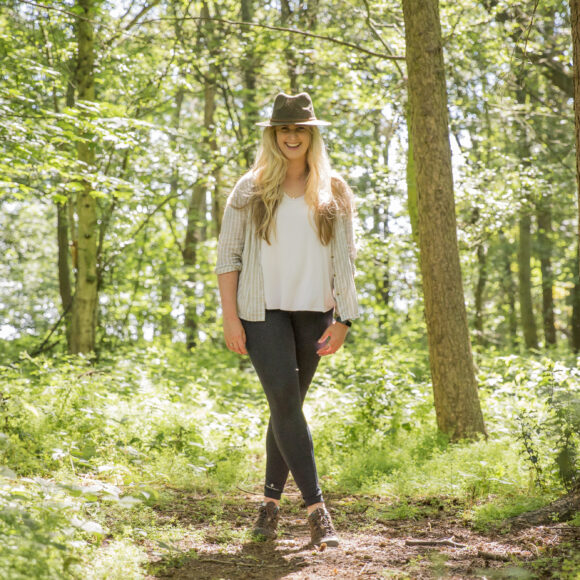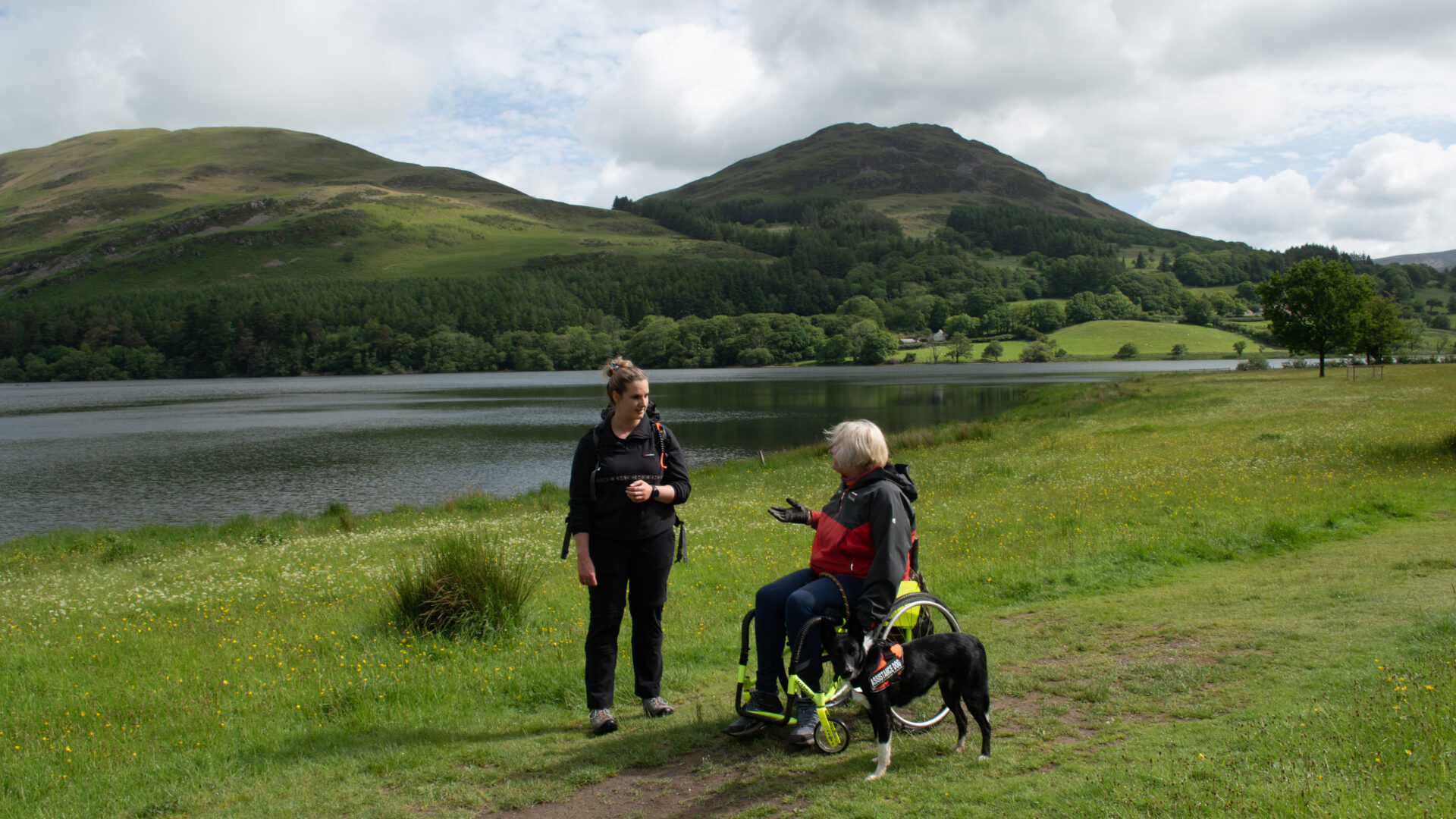
Inspired by nature: Charlotte Ditchburn
-
Date posted: 28/07/2022
-
Time to read: 10 minutes

Charlotte Ditchburn
A Lake District native, Charlotte Ditchburn works full time in the access sector and spends her free time advocating access and getting as many people outdoors and enjoying nature as she can. She is an ambassador for Ordnance Survey and British Canoeing, as well as a Hill and Moorland leader.
“I think what needs to change about access now is really considering the different users. Government funding is focusing on walkers and cyclists, but we need to be looking at all non motorised users,” says Charlotte Ditchburn.
Growing up in the Lake District, Charlotte describes being in outdoor spaces from a young age but, at the time, she found it difficult to recognise the benefits. “It was hard to avoid the outdoors up here, but I didn’t actually connect that much with it,” she admits. “It was around me and I was immersed in it, but I didn’t make the most of it.”
Despite this, she recognised that she was a naturally outdoorsy person and chose to study Countryside Management at university. And it was the experience that she had while studying that made her realise how important access to the outdoors was. “Whilst I was at uni, I was diagnosed with anxiety, depression and PTSD,” Charlotte shares. “This was my transition into realising how much value nature has and how much impact it can have on your mental health. I started re-immersing myself in it and enjoying it more. From there, I went out hill walking and started wild swimming. I’ve even taken up paddle boarding. These sorts of things have helped to improve my mental health. Now I really do value the Lake District and every ounce of nature it has. It’s got a really special place in my heart. When I moved away there was a feeling that I wasn’t quite at home and a longing to come back.”
Charlotte’s experiences in National Parks have also helped her better understand access and land management. “I did work experience with Lake District National Park when I was at school. I enjoyed learning about the whole work ethic they have behind them and all the different projects they get involved in,” she explains. “I’ve also volunteered with the Calvert Trust, which is horse riding and carriage driving for people with disabilities. It really reinforced how much everyone can access the outdoors and opened my eyes. In that way the Lakes had a huge part in my learning.”
The Lake District is currently at the top of Charlotte’s National Park list but that might be changing soon! “A couple of university friends and I are doing a challenge to visit every National Park,” she says. “We’ve been to the Lake District obviously, Northumberland because we went to Newcastle University, and we’ve also been to the Cairngorms and Loch Lomond and the Trossachs. Next on the list is the Norfolk Broads – they all offer such different things. I’m not sure the Lakes will be my favourite by the end of that challenge,” she confesses.
Volunteering has played a big part in Charlotte’s life and has allowed her to explore some of what makes National Parks unique. “I did a work placement with Northumberland National Park during university and I’ve ended up volunteering with them for many years. It has such a different landscape to the Lake District,” she explains. “The Lake District has all these ‘honeypot’ places that we know and love, and want to go and get a picture in. But then Northumberland has hidden gems that you don’t necessarily read about as much, and you don’t see on Instagram. They’re really beautiful and stunning. Playing a part in protecting those places as a volunteer, as well as helping other people to access those places and giving them background knowledge, too, opened my eyes to the conservation world. It was Northumberland National Park that got me into access work in the first place. My career aspirations have really come out of there.”
Working full time to create a more accessible UK outdoors, Charlotte has been responsible for ensuring that as many people as possible have access to the UK’s outdoor spaces. “The access sector is essentially public rights of way in England and Wales. I started off as a Public Rights of Way Officer in Suffolk. It included on-the-ground work with landowners, definitive map work – all the boring sort of stuff but it was interesting to me as a nerdy person to get stuck into the nitty gritty. This gave me my first experience of Rights of Way and access, and sparked something inside me to follow more jobs in the access world.”
Next Charlotte moved from her work in Suffolk into access in the horse world. As someone who had ridden since she was four, it was a step that allowed her to combine two areas that she was passionate about. “I’ve always been into my horses,” Charlotte shares. “I’ve competed at BHS Championships on riding school horses and enjoyed that. I coach at the Calvert Trust every weekend and I’ve also coached for Riding for the Disabled for three years. Last November, I got my carriage driving qualification so I started doing that as well. It gets me out in the stunning scenery – the mix of both the outdoors and horses keeps me quite happy.”
“From Suffolk, I moved on to the British Horse Society, working with them in East Anglia on improving access for horse riders and carriage drivers,” she says. “I then moved to Cumbria as a Rights of Way Officer establishing the coast paths in the area. That was something completely new – coastal access is a different ballgame. Now I’m back with the British Horse Society up here in the North.”
Charlotte’s work at the British Horse Society is varied. “It can look totally different from day-to-day,” she explains. “One day could be spent looking at historic maps or researching routes that could be lost and submitting applications so that they aren’t. Another day could be going out and doing a recce of routes for horse riders, going down to beaches, such as Formby and just having a nice day out while checking out the routes.”
Charlotte highlights the need to focus on non-motorised users. “The new Highway Code prioritises pedestrians, cyclists and riders – we need to be looking at how we can get these people from A to B safely, off the roads and through the beautiful countryside that we have got,” she emphasises. “I think that’s achievable on a local level if local councils and local people engage with each other.”
“We also need to focus on disabled access – it drops off the radar quite a lot. Often organisations will think, ‘Oh it doesn’t quite meet the needs and the specifications we’ve been given’ so they do nothing. However, if you can provide something, that’s much better than just excluding people completely.”
Charlotte has a broader vision and it’s one that we are increasingly hearing calls for across the UK. “On a bigger scale, I would like to see the Right to Roam throughout England and Wales,” she says. “Scotland is showing a brilliant example. There are some issues on both sides, but I think it’s achievable and it is what we should be aiming for. The countryside should be open to everyone.”
We can all play a part in maintaining the access that we have and Charlotte wants us to think about how we can contribute. “It’s important to explore your area a little bit and check that your local routes are safe,” she explains. “The local dog walk or the route that you use through the fields may not be a protected right of way, so you can check and get in touch with organisations like the British Horse Society or Ramblers to see what can be done to protect it for future generations. There are a lot of rights of way out there that are not recorded on the definitive map. If we don’t record them they may be lost. It’s not just down to these big member bodies and national policy – if we all do our little bit it will get done.”
Charlotte is also involved in newer, more innovative ways to engage audiences with the UK outdoors, including Green Space Dark Skies. Led by Walk the Plank and commissioned as part of UNBOXED: Creativity in the UK, the project is a series of 20 gatherings in beautiful landscapes across the UK taking place until September. Individuals and groups are invited to participate in the events as ‘lumenators’ and become part of creating a new art experience in our natural landscapes.
“Green Space Dark Skies got in touch and asked if I’d be interested in working with them,” says Charlotte. “I’m going to be a lumenator at their event at Scafell Pike on 3rd September and also hopefully lead a navigation course on the day, too. I really like the values behind their project with mass gatherings and working together to experience nature, and to do so responsibly and protect nature. They are focusing on the right to explore the countryside in different ways and it really fits with how I’m working.”
To find out more about Charlotte’s work, visit her website or follow her on Instagram.
